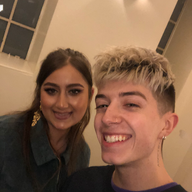The Dark Side of the Music Industry
- Zara Hussain
- Sep 1, 2025
- 6 min read
TW: Abuse, Eating Disorders and Sexual Abuse
The music industry loves to sell us a dream: fame, fortune, and a glamorous lifestyle. But behind the glossy magazine covers and sold-out stadiums lies a ruthless machine that chews up young artists and spits them out when they’re no longer profitable. Time and time again, we’ve seen young musicians, barely out of their teens, thrust into the limelight only to be overworked, controlled, and ultimately discarded by the very industry that promised them the world.
We all know her name. Britney Spears. The queen of pop music, her unique voice making her one of the most famous artists in the world.

Bursting onto the scene as a teenager, she was moulded into a pop princess, her every move dictated by managers, record labels, and even her own father. Her infamous 13-year conservatorship, which controlled her personal and financial life, highlighted just how little autonomy she had. A grown woman, earning millions, was unable to make basic decisions about her life. The #FreeBritney movement exposed just how cruelly the industry can treat its biggest stars.
It's no wonder she went ‘crazy’, her countless scandals involving when she shaved her head spontaneously.
The same fate nearly befell Taylor Swift, albeit in a different way.
Whether or not you are a fan, parts of her professional career are truly devastating. Her sheer talent and charisma was preyed upon, leaving her vulnerable in the industry.
While she was one of the few artists who retained some creative control over her music, she didn’t own the ‘masters’ to her first six albums—meaning that her own songs were controlled by record executives. When she tried to buy them back, they were sold to a businessman with no intention of letting her regain control.
Her response? Re-recording her entire back catalogue to reclaim her work. This was a power move, but it also exposed just how exploitative record contracts can be, even for the most successful artists in the world.
Boy bands have also fallen victim to the industry’s relentless hunger for profit. The next two examples being close to my heart.
One Direction, put together by Simon Cowell’s machine, were a global sensation—but they were also heavily controlled. Their schedules were brutal, their creative input minimal, and their individual aspirations ignored in favour of a manufactured, highly profitable brand. They put out albums in a way that was unsustainable, leaving them overworked and mentally drained. In the years since their split, members have spoken about how exhausting and restrictive their time in 1D was. Before his devastating passing, Liam Payne was open about the stress when being in the band.
A more recent example is Why Don’t We, a boy band that shocked fans when they revealed they were allegedly trapped in a psychologically abusive environment. They described their management as dictatorial, controlling every aspect of their lives, from when they could eat to how they were presented to the public. They have since lost ownership of their name and music, forced to stick to their solo-music.
I used to go to every Why Don’t We tour, meeting them often, my bedroom filled with photos of them. I became somewhat friendly with the boys, my heart breaking when I think about what they went through, whilst ensuring millions of young girls were still smiling and singing along.
I had many conversations with their manager, David Loeffler, no idea of his true self. A quote from their statement further shows this: “He would not only live with us during the day but controlled us 24/7, setting an alarm that would go off if any door or window was opened… We were not given the security code to the alarm, essentially making us hostages in our own home.”
They were malnourished to the point of developing eating disorders, verbally berated and alienated from their loved ones. They were simply teenagers trying to create music.
You may have heard of Dr Luke, notorious in the industry as a successful producer. He has worked with the likes of: Maroon 5, Britney Spears, Avril Lavigne, Jennifer Lopez, Doja Cat, Katy Perry and Miley Cyrus.
Kesha was one of the most up-and-coming artists in the 2010s, working closely with Dr Luke, until she accused him of drugging and raping her. She had just turned 18, promised fame by the producer if she dropped out of school. She was used, unpaid and uncredited for work, her potential destroyed by an abusive, fame-hungry man.
A real inspiration to me, Megan Thee Stallion, took her own label to court after they allegedly blocked her from releasing new music—yet another case of an artist being shackled by the very system meant to support them.
Similarly, RAYE made headlines last year when she publicly called out Polydor for refusing to let her release her debut album, despite dedicating seven years to the project.
A gifted songwriter with a powerhouse voice, RAYE had been used as a hit-making machine for others, penning tracks for the likes of Beyoncé and Little Mix while being sidelined as a solo artist. “I have had albums on albums of music sat in folders collecting dust,” she wrote in a bold Twitter thread, taking a career gamble by speaking out against her label.

According to RAYE, Polydor didn’t think she was “good enough” to put out an album and left her obsessively monitoring streaming numbers and stats in a desperate bid to prove her worth.
In a rare twist, the split between artist and label was surprisingly civil—but the real victory came when RAYE, finally free to release music on her own terms, soared straight to number one with the first single from her long-awaited debut album My 21st Century Blues. A well-earned triumph over an industry that too often silences its brightest talents, and one of my favourite albums so far!
The music industry is a billion-pound business, and young artists are its most lucrative assets. Labels and managers sign them young, often with exploitative contracts that lock them into years of work with little financial reward. The promise of fame blinds young musicians, who often don’t have the legal knowledge or power to negotiate fair deals. Once they’re in, they’re subjected to brutal schedules, intense media scrutiny, and an almost total loss of control over their own image and music.
If exploitative contracts weren’t bad enough, the music industry remains a toxic “boys’ club” where women routinely face discrimination, harassment, and outright abuse. A damning report from the Women and Equalities Committee (WEC) exposed the extent of misogyny in the industry, calling it “endemic” and demanding urgent action to address it.
Despite progress in representation, female artists still receive fewer opportunities than their male counterparts, suffer from persistent pay gaps, and are often valued more for their looks than their talent. The problem is even worse for women who face intersectional barriers, particularly racial discrimination.
Sexual harassment and abuse remain disturbingly common, yet the culture of silence means many victims either don’t report incidents or face career-ending consequences if they do. Some women have even been forced to endure sitting next to their abusers at industry events, reinforcing just how deeply ingrained this toxic culture is.
Pop star Ellie Goulding is one of many artists who have spoken out about this issue. In a guest edit for BBC Radio 4, she described the unease she felt when alone in a studio with male producers. “I had to try and figure out if it was something going on in my own head and I just had that general sense of fear anyway... but then hearing so many other similar stories from female musicians and singers, I realised I wasn’t alone in it at all.” Her words echo the experiences of countless women who have been made to feel unsafe, undervalued, and unheard in an industry that should be celebrating their talent.
Why does this keep happening? Simple: money.
So how can we combat this?
1. Education on Contracts – Aspiring musicians need to be educated about their rights. Understanding contracts before signing them can prevent many of the issues artists like Taylor Swift and Why Don’t We have faced.
2. Support Ethical Labels & Independent Artists – Streaming services like Spotify have made it easier for artists to distribute music without major labels. Supporting independent musicians and ethical labels puts pressure on the industry to change its exploitative practices.
3. Hold the Industry Accountable – Movements like #FreeBritney and Taylor Swift’s fight for her ‘masters’ have shown that public pressure works. Fans need to demand better treatment for their favourite artists and refuse to support labels and managers with a history of abuse.
4. Better Mental Health Support – The emotional and mental toll of the industry is immense. Artists need better mental health support and work-life balance to prevent burnout and breakdowns.
5. Legal Reform – Stronger laws protecting young artists from exploitative contracts and abusive management would go a long way in preventing these issues in the first place.














